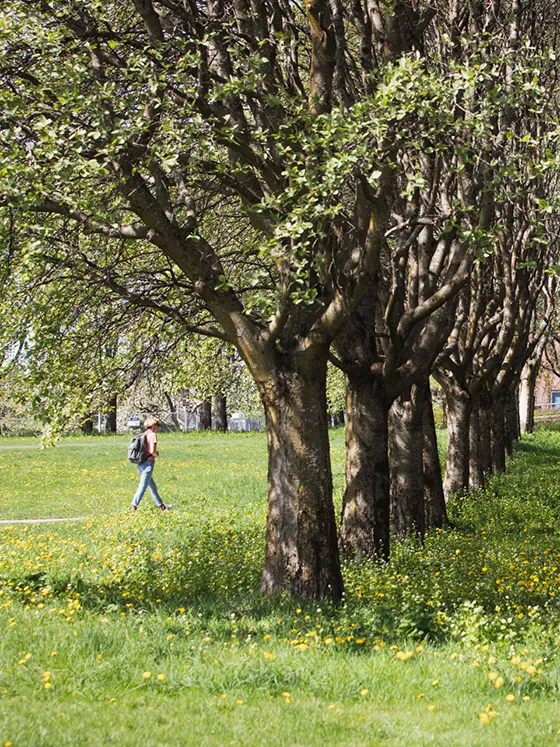In size The University of Oslo can be compared to a medium-scale Norwegian city. We aim to halve our greenhouse gas emissions by 2030 through research-based measures. The entire organisation must participate in order to adapt quickly.
What we are doing at UiO
We will:
- reduce our energy consumption by 30 percent
- halve our travel emissions
- set environmental requirements for the procurement of goods and services
- reduce waste and improve sorting at source
- ensure sustainable maintenance

Travel
We will cut work-related travel emissions by at least 50 percent by 2030 – compared to 2018 levels.
UiO will secure a travel agreement that makes it easier to make environmentally friendly choices and shows the specific emissions associated with a given trip.
Emissions from 7000 employees and 26,000 students moving to and from campus are considerable. Therefore, we want to better facilitate services for cyclists, pedestrians and those who travel by public transport.
Energy consumption
We will cut energy consumption on campus by 30 percent by 2030 – compared to 2018 levels.
UiO utilises smart control systems to make energy consumption as efficient as possible. In 2020, UiO started producing its own energy from the Climate House in the Botanical Garden.
In 2024, we will install solar panels at the roof of Ole Johan Dahls House. Suitable buildings will be equipped with sunshades in order to reduce the use of ventilation.
Buildings
Our campuses comprise nearly 100 buildings. That is why we are working to make maintenance and renovations more sustainable. We are reusing materials extensively in the renovation of our buildings, and we are in the process of upgrading windows to minimise energy loss.
In complete renovations UiO aims to produce our own heating and energy where possible. Sophus Bugges hus is heated by geothermal energy from a 250 meter deep well park that was created when the building was renovated in 2017.
More than 70 percent of waste from construction projects is recycled.
Procurements
In 2022, UiO procured goods and services worth NOK 2.7 billion. We can influence the market as a consumer, producer, builder and property manager.
Through our procurements, we will contribute to sustainable and socially beneficial solutions. In 2024, a new procurement strategy will be developed to help secure this.
We use fossil-free vehicles wherever possible, and eco-certified products are used for cleaning. In 2024 we will make it easier for our employees to reuse furniture and equipment.
UiO’s fund management is of course fossil-free.
Outdoor areas
UiO’s outdoor areas include everything from parks and lawns to the Botanical Garden and the Museum of the Viking Age at Bygd?y. The goal is to promote biodiversity and create well-being and enjoyment of nature.
25 percent of our lawns are set aside for insect-friendly and species-rich areas where the grass is allowed to grow tall. In 2024, this will be increased to a total of 40 percent. We take good care of the trees in our areas and do not use mineral fertilizers or pesticides.
Several red-listed species grow at the Museum of the Viking Age at Bygd?y, and we will of course safeguard these when building our new museum. At Campus Blindern, thousands of bee-friendly summer flowers are planted.
The Botanical Garden is a scientific collection of 5500 plant species.

Waste management
We will throw away less and recycle more. We will use furniture and IT equipment for longer periods of time and avoid unnecessary disposable products at meetings and events.
A dedicated lending scheme has been established for the use of furniture on campus, and we have a lending scheme at the Humanities and Social Sciences Library for equipment and utility objects that students and employees can use.
Food
UiO has implemented a catering agreement that will reduce emissions from food by at least 60 percent. All the food UiO orders for meetings and events will be:
- Climate-friendly
- Environmentally friendly
- Socially sustainable
- Healthy
On campus, the Student Welfare Organisation (SiO) is responsible for the food services.
Your contribution matters

Employees and students play an important role in making UiO more climate and environmentally friendly. You can contribute by:
- walking, cycling or travelling by public transport to campus
- choosing vegetarian meals and avoiding disposable plates, cups, and cutlery
- assessing whether your work-related travel is necessary
- checking the Library of Things before buying anything new
- recycling all waste